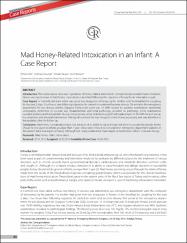| dc.contributor.author | Bilir, Özlem | |
| dc.contributor.author | Ersunan, Gökhan | |
| dc.contributor.author | Yavaşi, Özcan | |
| dc.contributor.author | Kalkan, Asım | |
| dc.date.accessioned | 2020-12-19T19:50:12Z | |
| dc.date.available | 2020-12-19T19:50:12Z | |
| dc.date.issued | 2016 | |
| dc.identifier.citation | Bilir, O., Ersunan, G., Yavasi, O., Kalkan, A. (2016). Mad honey-related intoxication in an infant: A case report. Journal of Emergency Medicine Case Reports, 7(4), 80-+. https://doi.org/10.5152/jemcr.2016.1476 | en_US |
| dc.identifier.issn | 2149-9934 | |
| dc.identifier.uri | https://doi.org/10.5152/jemcr.2016.1476 | |
| dc.identifier.uri | https://hdl.handle.net/11436/2398 | |
| dc.description | Kalkan, Asim/0000-0002-5800-0201 | en_US |
| dc.description | WOS: 000385740100007 | en_US |
| dc.description.abstract | Introduction: the nutraceutical value and ingredients of honey make it attractive for complementary and alternative medicine. Herein, we report a case of mad honey intoxication in an infant following the ingestion of honey for an intractable cough. Case Report: A 5-month-old male infant was given two teaspoons of honey by his mother with his breakfast for coughing for the past 2 days. Four hours later following ingestion, he started to vomit and became drowsy. on arrival at the emergency department, he was drowsy and his Glasgow Coma Scale score was 10. With respect to systemic examination, abdominal sonography, performed to exclude any intraabdominal and renal pathology, revealed no pathology. Urine examination revealed proteins and hemoglobin. He was not given any other treatment except fluid replacement. At the fifth hour of arrival, his symptoms and physical examination findings all resolved. He was thought to have honey poisoning and was admitted to the pediatric clinic for follow-up. Conclusion: Mad honey is a natural product, but because of its ability to cause allergic reactions in susceptible people, honey should not be given to infants younger than 1 year. Intoxication should be considered in emergency department patients in the eastern Black Sea region of Turkey. Although not clearly established, there might be nephrotoxic effects in human beings. | en_US |
| dc.language.iso | eng | en_US |
| dc.publisher | Aves | en_US |
| dc.rights | info:eu-repo/semantics/openAccess | en_US |
| dc.subject | Mad honey | en_US |
| dc.subject | Infant | en_US |
| dc.subject | Intoxication | en_US |
| dc.title | Mad honey-related intoxication in an infant: A case report | en_US |
| dc.type | article | en_US |
| dc.contributor.department | RTEÜ, Tıp Fakültesi, Cerrahi Tıp Bilimleri Bölümü | en_US |
| dc.contributor.institutionauthor | Bilir, Özlem | |
| dc.contributor.institutionauthor | Ersunan, Gökhan | |
| dc.contributor.institutionauthor | Yavaşi, Özcan | |
| dc.identifier.doi | 10.5152/jemcr.2016.1476 | |
| dc.identifier.volume | 7 | en_US |
| dc.identifier.issue | 4 | en_US |
| dc.identifier.startpage | 80 | en_US |
| dc.identifier.endpage | + | en_US |
| dc.ri.edit | oa | en_US |
| dc.relation.journal | Journal of Emergency Medicine Case Reports | en_US |
| dc.relation.publicationcategory | Makale - Uluslararası Hakemli Dergi - Kurum Öğretim Elemanı | en_US |


















